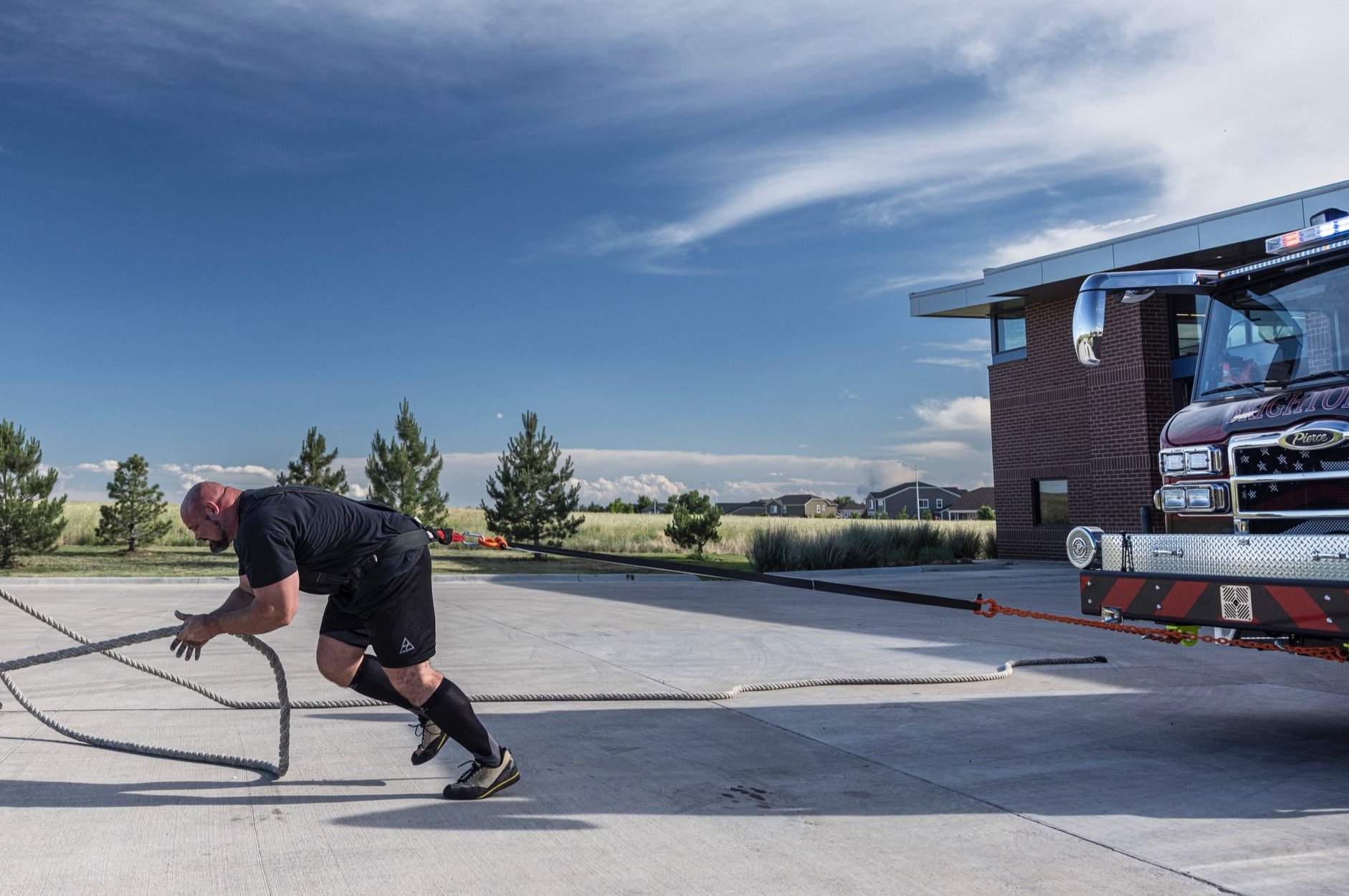
How Brian Shaw, the World’s Strongest Man, Balances Fatherhood, Competition, Training, and Consuming Up to 11,000 Calories Per Day
By Steven John
It’s not easy being the World’s Strongest Man, but that’s a title Brian Shaw has won an astonishing four times — not to mention his unmatched record of being a World’s Strongest Man finalist 11 consecutive times. To win that competition, he’s done things like overhead presses with 830 pounds of weight, he has pulled vehicles like busses, trucks, and airplanes, and he’s lifted the famous (or perhaps infamous, we should say) Atlas Stones.
But while a strongman competition is undeniably tough stuff, it’s the training that leads up to each event that is the true challenge, and that’s all the more true when, for Brian Shaw, training is balanced with running multiple businesses and being a devoted husband and father to two young kids.
Given all that Shaw has to shoulder, we certainly appreciated getting the chance to sit down with him (well, remotely) for nearly an hour a few days back. Our conversation covered everything from counting calories (as in how many he can eat, not how many he can avoid), playing outdoors with the kids, what company makes the strongest duct tape (yes, we talked about tape — turns out Shaw uses a Dad Gear Review favorite, T-Rex Tape), training for strongman events, and more.
Knowing just how hard it is to get oneself into condition to vie for (and win) a title like World’s Strongest Man, that’s where the conversation started.
What is the hardest thing about training for a major competition?
“I would say the hardest thing about training for any major competition is being 100% focused on that end goal,” Shaw replied. “So it’s keeping the thought in your mind that through all of this training, all of this eating, all of the recovery work, all of that is for me to be the best I can possibly be at the actual competition. So it’s listening to your body with your training, being smart with your body during your training, facing and dealing with any adversity, any ups and downs that come through — because that’s all going to happen, you are going to have good days and bad days. And you’re going to have everything in between, so it is being able to maintain that focus on being the best on game day when it really matters.”
What do you need to eat in a given day when you’re training?
“Leading up to a contest for me, the way I have always done it, is I eat into the contest. So when I’m a ways out from the competition, I may be eating 8,000 calories in a day. That’s when I’m a ways out from the contest, just starting to train. And then as I’m right there before the day, I get up into the 10 or 11,000 calorie per day range. So it’s a tremendous amount of eating. I might eat a pound of meat in a given meal, and you have to do that every couple of hours, eating so much protein, adding carbs.”
What are your favorite exercises in training? And any least favorites?
“Well, with the training, I’ve always really enjoyed it. And I enjoy getting better at things, so I try not to have least favorites. For example, early on in my experience I had an event, the log press, that just didn’t come quite as naturally and I had to work really hard to build the strength up in my shoulders and triceps and that type of thing. A lot of people in this sport tend to focus on events they enjoy doing, that they’re good at, so if they’re great at deadlifting, they will love doing the deadlift. But for me what I always try to do is reframe things in my head and instead of focusing on the fact that I didn’t like an event, I tried to switch it to think of it as my favorite because I got to train and improve and get better at it. But keep in mind, for me it was years and years of work, for example, to get my log press to a place where I was happy with it.”
How did you get into strength competitions in the first place, and when did it become clear you had a real knack for strongman events?
So for me, my background was in basketball, I played basketball in high school, and all through college. I got into weightlifting in high school, and it was something I was very drawn to right away, because for me, walking into the gym, and putting in the training in and seeing the results that came from it was something that just made sense. If I went in there and lifted, I would get stronger. And I felt better, and when it came to basketball I could run faster, shoot better, I had better endurance, and I really saw how the weight training just opened up more opportunities in general. It just opened up the door, and I was able to play more in college, and play better.”
“I got to a point, sometime in my junior or senior year of college, where I really enjoyed lifting more than playing ball, my love and passion was just drifting toward that, so when I got out of school I planned to be a strength coach. I got that opportunity, but I was also at a point where I still wanted to do things for myself in my own athletic career, and I didn’t know exactly what, but I just kept on training to get stronger, because I just loved going into the gym, and the process of lifting and getting stronger and coming back and repeating it, and seeing how strong I could get. So strongman and really didn’t come into the picture until I was out of college and training on my own.”
“Ever since I was a kid I just needed a competition, something to motivate me, something to train for, and so I realized that strongman was a perfect thing for me, because I got to lift, I got to compete, and I got to find out, basically, how good I could be. I entered my first contest really without any special equipment, any special training, I had just been working out at a regular gym, and at that time the access to special training facilities and equipment really wasn’t that good anyway, at least near me, so I kind of had to start building my own equipment, anyway, when I started entering contests I did really well right off the bat, and I really enjoyed it. So I started to work my way up the ranks so to speak, entering different levels of contests. And then in a fairly short amount of time I turned pro in strongman, which really opened a lot of opportunities, and it allowed me to compete with the best in America, and I took every opportunity I could get. When I got to my first World’s Strongest Man — and I didn’t reach the finals that year — I just knew: ‘OK, I can win this.’ It wasn’t a question for me anymore. That was 2008. In 2009 I came back and got 3rd overall, so that was a really big improvement. I tied for World’s Strongest Man in 2010, the first time that had ever happened, and I came in second because they did a count back, but then I came back and won in 2011.”
What role did the outdoors play when you were growing up?
“I played outdoors all the time, just all the time. Growing up it was something where my mom and dad — I had an older brother and a younger sister, so I was right in the middle — our parents would just kick us out the door and say go ride your bike, go get dirty, go have fun, so we would do that. I lived in Colorado, so we used to go up to the mountains and that was always so much fun, to go fishing, to go for a hike, and it was just so peaceful, and I remember that clean, pure air, that stuff that leaves impressions when you are a kid. Even now, going up to the mountains, I just love that. It’s a reset for me. I love nature in general, being outside was always the best, and still is.”
How do you encourage fitness, recreation, and outdoor play for your kids?
“Well, my wife and I both work out. Fitness is very much a part of our lives, so our kids, who are six and four, have always seen that. When they were younger, my wife used to literally work out in the living room with them, so they would be sitting there playing and she would be doing her work out, but now, the more and more they have gotten to see us, and see me, they have their own interests in working out and fitness. Like they will set up an obstacle course, they’ll do their own thing. We are definitely big fans of them playing outside and using their imagination, and just getting dirty, whether they’re playing on the swingset or digging in a pile of dirt or making up a game, we just think it is important for kids to be active, but also to be using their minds and their imaginations.”
“It’s such a balance nowadays compared to when I was a kid, because we didn’t have an option of iPads or screens — the TV, when I was a kid? You had to get up and walk across the room to change the channel. And I just didn’t have that same amount of screen time. We want them to learn computers and technology and such, but it’s also just so important that they are active. We always try to let them be creative when it comes to being active, I never push them into fitness or anything, and sometimes even have to tell them to scale it back as they try to copy us, but the kids really have a knack for being active and healthy, so it’s just great to see. Like when we let them try to lift this or that object, try to do things like that. Of course, we are always saying: ‘Hey, you might want to take it easy on this or that one!’ I just want them to have fun. If they really love working out and training and all that, so be it. But what my wife and I are really trying to instill in our boys is just the sense that, whatever you want to do, just really go after it with everything that you have, try to be the best you possibly could be, because that would really is what’s important. For me it was lifting and strongman and so for me, that was easy to do. But I think everyone needs to find their passion. Look, it’s great to see them taking an interest in working out, in going outside and being active, but really they just need to find their own passions.”




